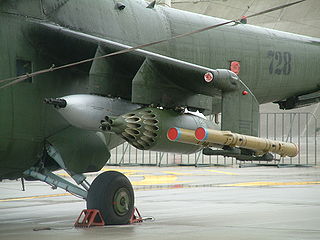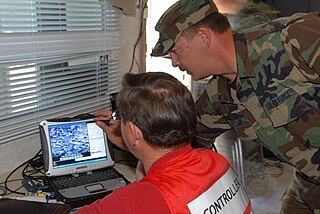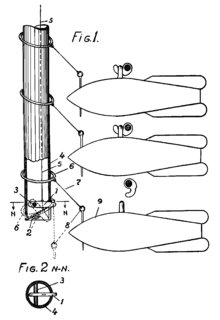 W
WAir-to-ground weaponry is aircraft ordnance used by combat aircraft to attack ground targets. The weapons include bombs, machine guns, autocannon, air-to-surface missiles, rockets, air-launched cruise missiles and grenade launchers.
 W
WAircraft ordnance or ordnance is weapons used by aircraft. The term is often used when describing the weight of air-to-ground weaponry that can be carried by an aircraft or the weight that has been dropped. Aircraft ordnance also includes air-to-air, anti-ship and anti-submarine weapons.
 W
WA ball turret was a spherical-shaped, altazimuth mount gun turret, fitted to some American-built aircraft during World War II. The name arose from the turret's spherical housing.
 W
WThe bomb bay or weapons bay on some military aircraft is a compartment to carry bombs, usually in the aircraft's fuselage, with "bomb bay doors" which open at the bottom. The bomb bay doors are opened and the bombs are dropped when over the target or at a specified launching point.
 W
WGun cameras are cameras used primarily in aircraft to help measure tactical effectiveness. These cameras are triggered by the firing of a weapon, hence the name.
 W
WA hardpoint is a location on an airframe designed to carry an external or internal load. This includes a station on the wing or fuselage of a civilian aircraft or military aircraft where external jet engine, ordnance, countermeasures, gun pods, targeting pods or drop tanks can be mounted.
 W
WThe M10 smoke tank, also known as Smoke Curtain Installation, was an aircraft under wing tank used by the United States Army Air Forces to lay smoke screens or dispense chemical weapons such as tear gas. The tanks held a maximum of 30 gallons, and weighed, when full 588 pounds and could lay a smoke screen about 2,000 feet long.
 W
WThe Mitrailleuse d'Avion Browning - F.N. Calibre 13,2 mm, more commonly known as the FN Browning M.1939 or the Browning FN was a heavy airplane machine gun built for export the year prior to WW2 by Fabrique Nationale "FN herstal" in Belgium.
 W
WThe Rose turret was a gun turret fit to the rear position of some British Avro Lancaster heavy bombers in 1944–45. It was armed with two American light-barrel Browning .50-calibre AN/M2 heavy machine guns — the standard American defensive weapon used in turreted and flexible mounts in the B-17 Flying Fortress and B-24 Liberator.
 W
WRemotely Operated Video Enhanced Receiver (ROVER) is a system which allows ground forces, such as Forward air controllers (FAC), to see what an aircraft or unmanned aerial vehicle (UAV) is seeing in real time by receiving images acquired by the aircraft's sensors on a laptop on the ground. There's little time delay and usage of ROVER greatly improves the FAC on the ground reconnaissance and target identification which are essential to close air support.
 W
WSwiatecki bomb slip - was slip bomb device of Polish inventor Władysław Świątecki used in many allied bombers during World War II.
 W
WThe United States military has developed a number of Helicopter Armament Subsystems since the early 1960s. These systems are used for offensive and defensive purposes and make use of a wide variety of weapon types including, but not limited to machine guns, grenade launchers, autocannon, and rockets. Various systems are still in use, though many have become obsolete.